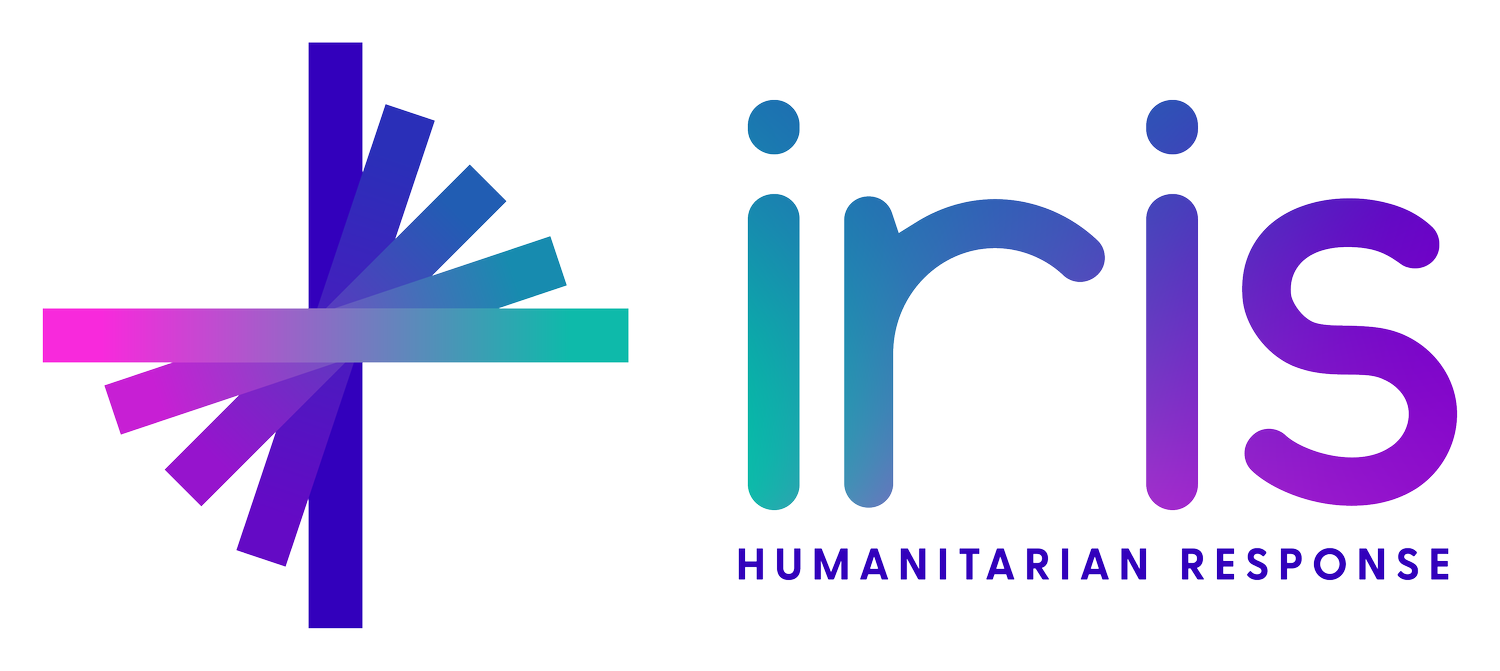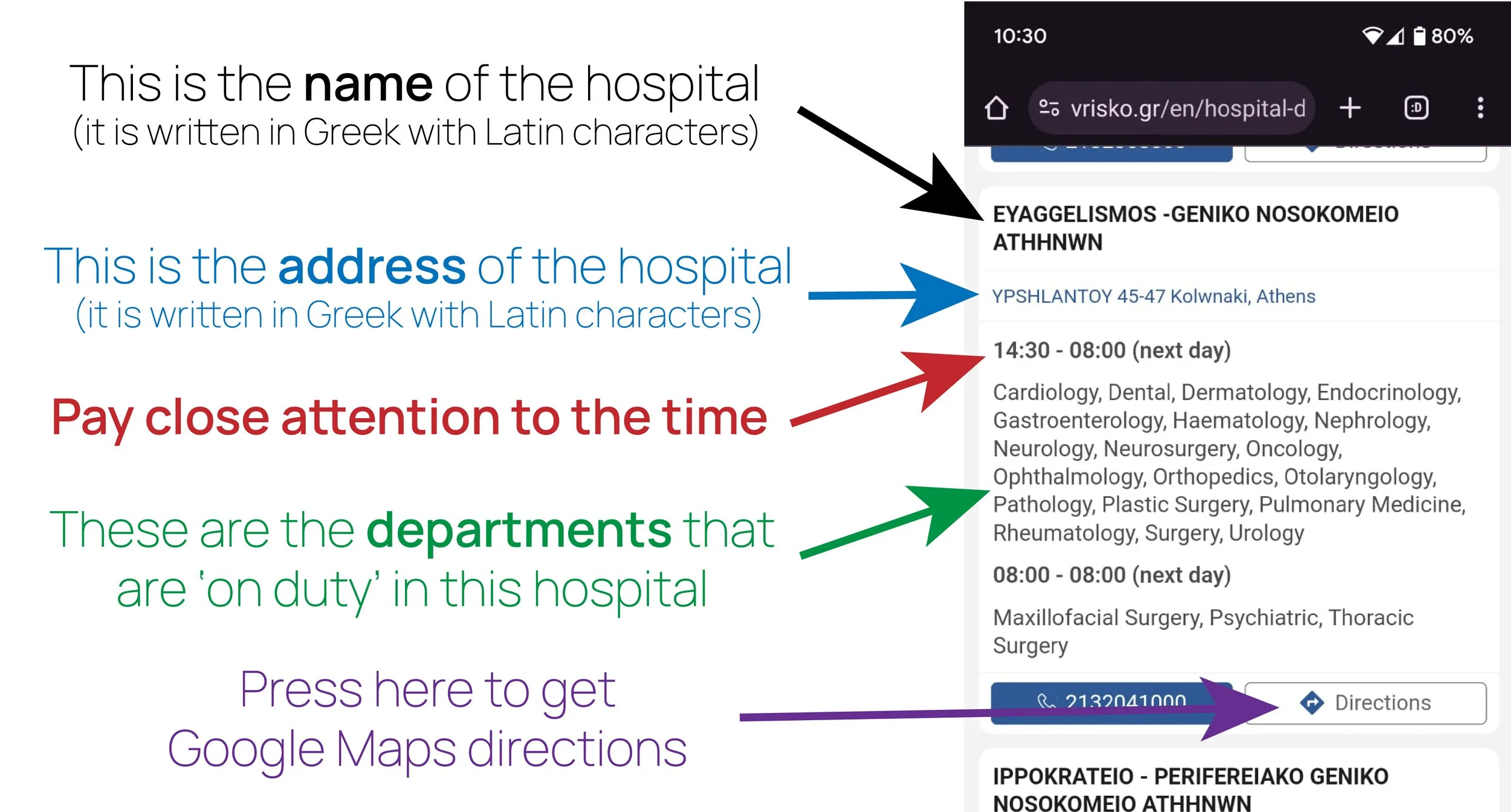What to do in a health emergency
In a health emergency in Athens, you have two options:
Call an ambulance
166 or 112 - For serious medical emergencies
OR
Go to the hospital by yourself
OPTION 1
Go to the hospital by yourself
*IMPORTANT INFORMATION*
Emergency departments in hospitals in Athens work on a rotating daily schedule. They are not all open at the same time. Also, each day, different hospitals focus on different health emergencies. For example, if you have a skin problem, then you might need to go to a different hospital compared to if you have an eye problem.
You need to find out which hospital is open for the health emergency that you have. If you go to the wrong hospital, they will probably send you away.
Is the health emergency for a child?
If the health emergency is for a child, immediately visit:
Paidon Agia Sofia (Η Αγία Σοφία) or Paidon Aglaia Kyriakou (Αγλαϊα Κυριακού)
(Both hospitals are next to each other, so you will easily find which one is ‘on duty’.)
If the emergency is not for a child, then continue to STEP 1
STEP 1 - Identify what type of emergency you have
Pathology
Παθολογική
General health emergencies
(if you are not sure, choose this one)
Cardiology Καρδιολογική
Heart problems
Dental Οδοντιατρική
Tooth and mouth problems
Dermatology Δερματολογική
Skin, hair, and nail problems
Gynaecology Γυναικολογική
Female reproductive health
Obstetrics Μαιευτική
Cares for pregnant women and delivers babies
Orthopedics Ορθοπαιδική
Bone, joint, and muscle injuries
Gastroenterology Γαστρεντερολογική
Stomach and bowel problems
Ophthalmology Οφθαλμολογική
Eye-related emergencies
Otolaryngology ΩΡΛ
Ear, nose, and throat problems
Pulmonology Ρευματολογική
Lungs and breathing problems
STEP 2 - Visit the vrisko.gr website
Visit the vrisko.gr website (links below).
On the site you will see a list of hospitals that are ‘on duty’ on that day.
(screenshot with explanation below)
1) You will need to scroll down the list until you find the department you need (Pathology, Cardiology, etc)
2) Make sure it is the closest hospital to you (Press on the ‘Directions’ to find this out)
3) Double check the times! Make sure that this hospital is ‘on duty’ when you are planning to go. *Note - the ‘on duty’ hospital often changes at 2:30pm.
4) Choose the hospital, and make your way there (using the Google Maps directions)
Links to vrisko.gr
(Choose English or Greek and press on the link below)
Alternatively…
Alternatively, you can visit the government website that is updated every day with information about the ‘on-duty’ hospitals.
https://www.moh.gov.gr/articles/citizen/efhmeries-nosokomeiwn/68-efhmeries-nosokomeiwn-attikhs
Each day has its own PDF file, and the information is displayed in a table.
(All the information is in Greek only)
OPTION 2
Call an ambulance
STEP 1 - Know your address and contact details
Make sure you know your address. You will need to explain:
Which area of Athens you live in (for example, Kypseli)
The name of your road and number of your apartment and maybe your postal code (for example, Xanthis 4, 113 61)
Which floor your apartment is on (for example, 3rd Floor)
The name on your buzzer/door bell
Your mobile phone number (the ambulance will probably call you when they are near)
STEP 2 - Description of the situation
You will need to describe and explain your health problem to them:
Nature of Emergency: Clearly tell them the medical issue or condition(for example, I cannot breathe well. I have pain in my chest. The pain started 2 hours ago.)
Personal Information: Age, gender, any other relevant information.
Medical History: Provide relevant medical history if it’s relevant (for example, known allergies, chronic conditions).
STEP 3 - Call
Call either 112 or 166 from your mobile phone (for free)
If can cannot explain your situation well in Greek, then call 112.
If you are more comfortable in Greek, call 166.
Only call an ambulance if you or a child has a sudden, urgent health situation that requires immediate medical attention to prevent serious harm or death.



